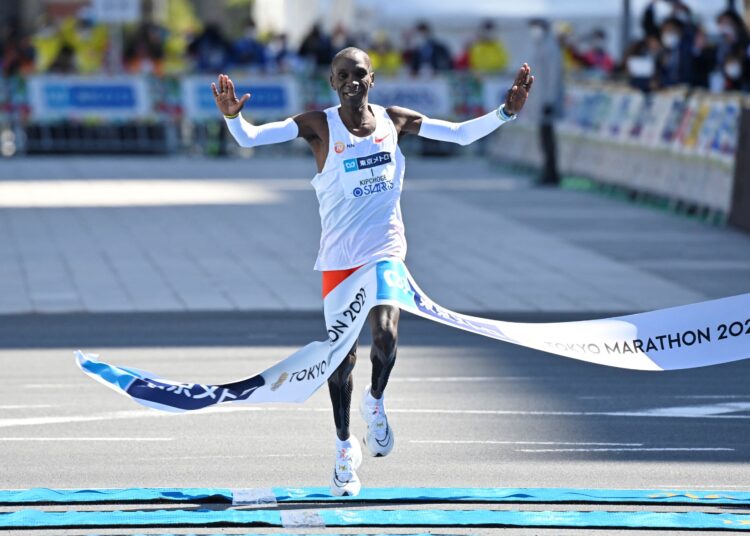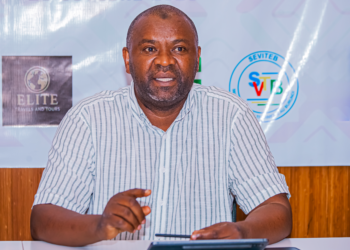Double Olympic champion and world record-holder sets course record in Japanese capital, while fellow Kenyan Brigid Kosgei does likewise on an historic day of marathon running
Eliud Kipchoge wrote another chapter in his extraordinary career by winning the Tokyo Marathon on Sunday (March 6) with relative ease in 2:02:40, a course record and the fourth-quickest time in history.
The 37-year-old Kenyan has now won four out of the six Abbott World Marathon Majors – Berlin, London, Chicago and Tokyo – and has just New York and Boston to go to complete the set.
Given that Kipchoge is the marathon world record-holder and has won two consecutive Olympic gold medals over the distance, there is now an argument to say that if he can triumph in both New York and Boston then he will have set an unrivalled legacy in distance running.
“I am so proud to win on the streets of Tokyo, where the people have running in their hearts and minds,” said Kipchoge on Instagram. “After winning my second Olympic gold medal in Japan last summer, I returned to Tokyo to run a strong race. And this is what I meant with a strong race, 2:02 victory and a course record. I’m proud to now have won four out of the six Abbott World Marathon Major races.
“Finally, I want to say I want this world to unite. If there are differences I want us to meet and speak, not fight. My win today is to bring positivity in this world. No human is limited.”
Even though he claimed Olympic gold on the streets of Sapporo last summer this was Kipchoge’s first experience of the Tokyo Marathon.
On this occasion, the Kenyan’s greatest challenge came from compatriot Amos Kipruto – marathon bronze medallist at the 2019 World Championships in Doha – who stayed with the race favourite until 35km.
To say that Kipchoge tolerated his fellow Kenyan before stepping on the gas would be a fair reflection of the race.
Earlier on in the contest the lead pack of eight elite men went through 10km in 28:37 and were then projected with a 2:00:45 finish, even after a wrong turn which cost Kipchoge and co. approximately 10 seconds.
After 25km the pace had slowed, with the leading men clocking 1:12:26 and the projection moving to 2:02:15. By 30km the leading pack consisted of just Kipchoge, Kipruto and Tamirat Tola – marathon silver medallist at the 2017 World Championships in London – and it was almost inevitable that the Olympic champion would kick on at some point.
The fact that such a move to the front has become a formality emphasises the aura that Kipchoge has established in distance running.
He has now won 13 out of his last 14 marathons and, excluding his eighth place on the short looped course at the rescheduled London Marathon two years ago, you have to go back to the Berlin Marathon in 2013 to find the last time Kipchoge failed to win.
Kipchoge was not the only athletes to create history in Tokyo, however. In the women’s race, world record-holder and Olympic silver medallist Brigid Kosgei crossed the line in 2:16:02, the third-fastest marathon in history. Only the Kenyan herself and Paula Radcliffe have run faster.
Kosgei was pushed hard by 2019 Berlin Marathon champion Ashete Bekere and Gotytom Gebreslase, who clocked 2:17:58 and 2:18:18 respectively.
The trio were a class apart from the rest of the field and they went through 30km in 1:36:59. Similarly to Kipchoge, Kosgei made her move around the 35km mark and in doing so also set a course record in Japan.
The 28-year-old has now won marathons in London, Chicago and Tokyo and is halfway to winning all the Abbott World Marathon Majors.
In the wheelchair division, Marcel Hug once again dominated to claim a second Tokyo Marathon title but his time of 1:22:16 didn’t beat the course record of Tomoki Suzuki’s 1:21:52 from 2020.
Home favourite Tsubasa Kina won back-to-back titles after clocking 1:40:21, just 21 seconds outside of her own course record.

















